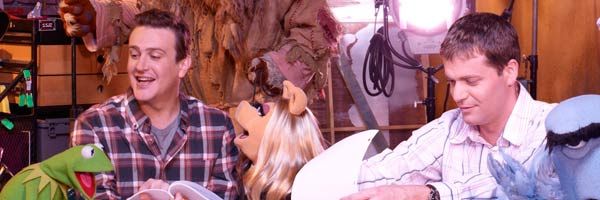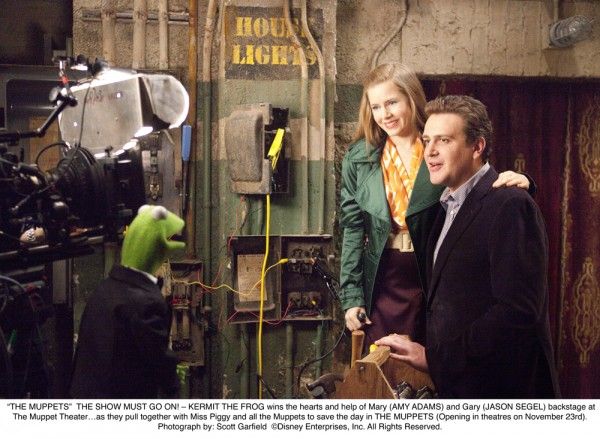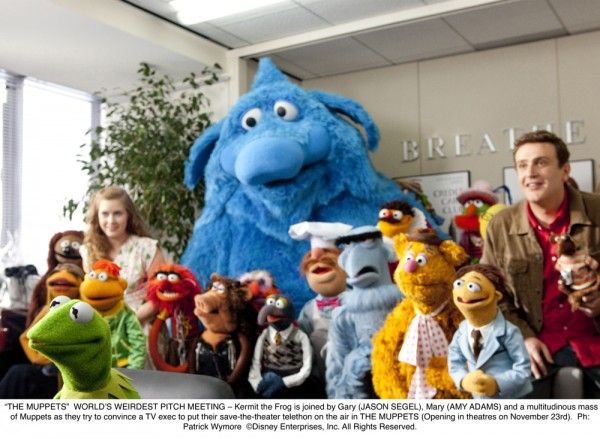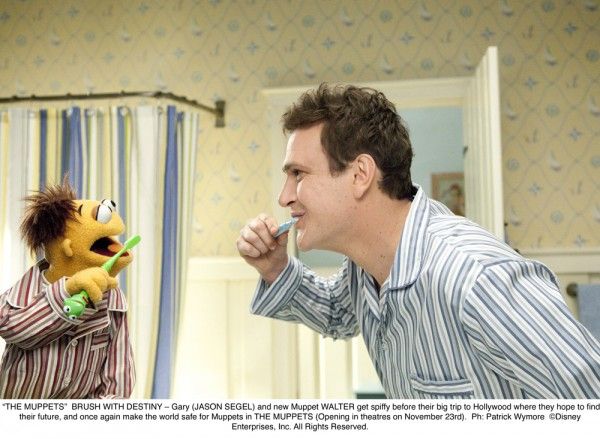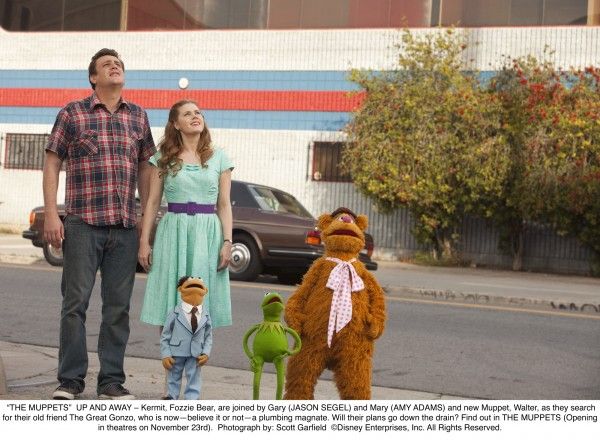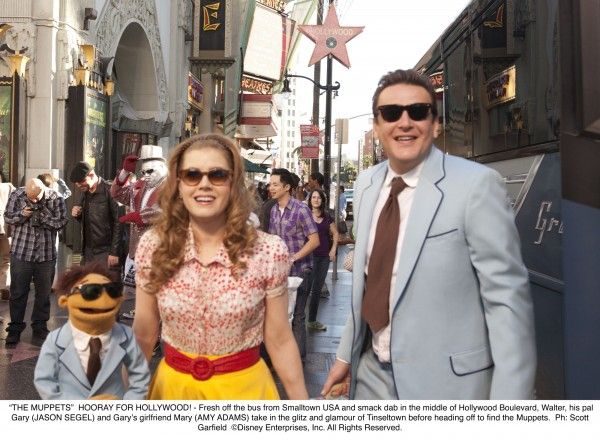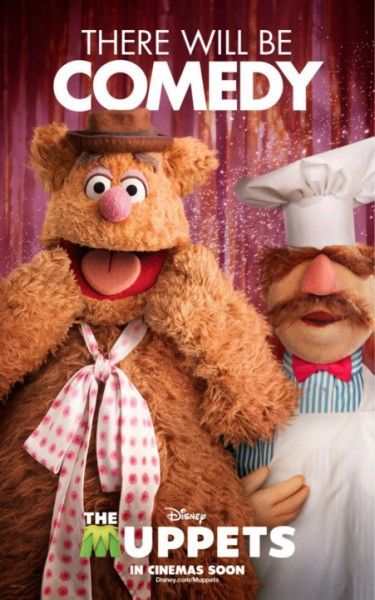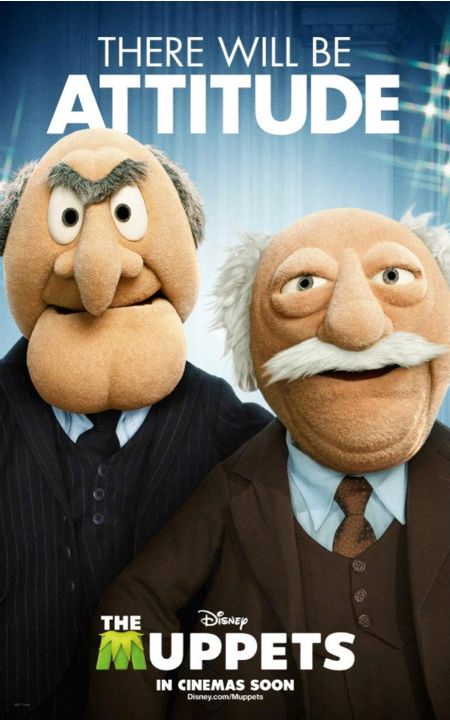In The Muppets, Walter, the world’s biggest Muppet fan, goes on vacation in Los Angeles with his brother Gary (Jason Segel) and Gary’s girlfriend, Mary (Amy Adams). While there, they discover the evil plan of oilman Tex Richman (Chris Cooper) to demolish the famed Muppet Studios and drill for the oil discovered beneath it. In order to save their old stomping grounds, the Muppet gang must band together and stage a telethon to raise the $10 million.
As big a fan of The Muppets as I am, it is clear that co-writers Jason Segel and Nicholas Stoller are as well, ensuring that their big-screen return was in the right hands. At the press day for the film, the two guys discussed the journey of bringing the Muppets to a new generation of audiences, why The Muppets’ lack of cynicism is important for kids, how much fun they had figuring out where these characters have been and what they’ve been doing since we last saw them, how good The Muppets are at improvisation, and walking away from the experience with an even greater appreciation for the puppeteers. Check out what they had to say after the jump:
Question: Was getting The Muppets back together the idea you had from the start?
JASON SEGEL: I must say that a lot of the plot came from [Nicholas Stoller]. I said, “I want to make a Muppet movie,” and he said, “Okay, I’ll think of the idea.”
NICHOLAS STOLLER: We had an initial phone call. [Jason] had a meeting at Disney, and then literally on that drive, we pitched out the whole thing.
SEGEL: Nick and I have a weird kismet relationship, so we riffed it out. But, Nick thought of a lot of it, and then I went in and pitched it. And then, I called Nick back and told him he was writing the movie with me. That is what happened.
How soon did that happen, after Forgetting Sarah Marshall?
SEGEL: It was the first thing that I pitched after Sarah Marshall. I did go in and pitch it alone, but Nick is my buddy and had helped me flesh out the idea. And then, while I was in there, I was like, “And, by the way, I’m writing this with Nick Stoller,” and they were like, “Oh, great! That’s terrific! I didn’t even know Nick would want to do this.” I was like, “Yeah!” And then, I called Nick and presented it as an option.
STOLLER: Yeah, it was awesome. It was thrilling. It paid off. It was very exciting.
Why do you think The Muppets still work today, when a lot of kids’ shows are much more cynical now?
SEGEL: I think that’s why they needed to come back. We have reached a very cynical era of comedy. The Muppets have proven, for 40 years, that you can get laughs without ever doing it at someone else’s expense, and I think that that’s a really important thing for kids to realize.
STOLLER: I also think the best entertainment isn’t cynical. The Pixar movies aren’t cynical. They’re heartfelt. Big, big hits like that aren’t cynical.
SEGEL: I think it’s that The Muppets remind us of who we wanted to be, when we were kids. They remind us of the best version of ourselves. The world beats out of you that anything is possible. You have this wide-eyed wonder, and then you come to the reality of what the world is like. But, The Muppets have never given in to that. They believe that they can accomplish anything, and they just go forward with their eyes open wide and a smile on their face. It reminds us of the best in us.
Jason, having been a fan of The Muppets since you were a kid, do you remember the moment you thought you’d like to write something for them?
SEGEL: My goal was to be a cameo in a Muppet movie, someday. I never thought that I would be working in this capacity with The Muppets. For Nick and I to get to write and produce a movie like this is thrilling, and it’s unbelievable. It really does feel like a fantasy, sometimes.
STOLLER: It’s all a giant prank.
Jason, what was it like to actually see yourself as a Muppet?
SEGEL: That’s how I see myself when I look in the mirror, since I was very young.
STOLLER: He suffers from a rare medical condition. It’s a problem.
SEGEL: A man can certainly be a Muppet. Being a Muppet is a state of mind. It’s about finding that little part of you that’s unique, and not being embarrassed by it, but cherishing it.
Was there any specific Muppet that you just immediately knew what to do with?
SEGEL: We knew that Animal should be in anger management.
STOLLER: A lot of that stuff came immediately.
SEGEL: We were trying to think of just the funniest places to find people.
STOLLER: The one that was cut early on, that would have been funny, was that the Swedish Chef was on Top Chef.
SEGEL: He was a judge on Top Chef, but you couldn’t ever understand his criticisms.
STOLLER: But, the people he was critiquing would be crying.
SEGEL: Fozzie Bear performing in Reno came pretty quickly.
STOLLER: That sequence was a lot longer. We trimmed it down for time.
How did you get the idea for the montage?
STOLLER: We wrote that part more than maybe any other part in the movie.
SEGEL: We wrote that part, over and over and over again. You didn’t know how many Muppets to service with full stories.
STOLLER: When you’re writing a movie, you have different theories. There are times when we thought, “Most of this movie is about getting The Muppets back together.” But then, we realized, “No, it’s not much of this movie.” And then, we split the difference .
SEGEL: The Muppets are always better together than they are apart. That’s one of the themes of the movie, so we wanted to get them together. My favorite in the montage, by the way, is Rowlf. That was neat.
What was it like to work with Bret McKenzie and put together the songs?
SEGEL: He was a perfect choice.
STOLLER: He’s just awesome. He’s great.
SEGEL: Flight of the Conchords is very Muppety. It’s about two wide-eyed innocents, making their way through tough New York. When we found James [Bobin], we knew that we had the perfect director for this movie ‘cause he knew how to do those musical numbers so well, and without a sense of irony. And so, then we brought Bret along and we felt very lucky.
STOLLER: I was so excited. I’ve been friends with James for years, before this. Actual friends, not Hollywood friends. When he expressed interest, I was thrilled.
At what point did you decide to use “Rainbow Connection”? Was that in the film, from the beginning?
SEGEL: It was not, actually. I remember the moment we decided to use “Rainbow Connection.” I was listening, in my car, to a CD of people covering Muppet songs, and there was a duet of “Rainbow Connection.” I had never heard it sung as a duet, between a guy and a girl, and I said, “Oh, this would be an amazing Kermit and Piggy resolution.” And then, in the middle of the song, drums kicked in and it became rockier. I thought, “Oh, my god, Animal hasn’t been drumming, this whole time. That’s where you resolve the Animal story, and you turn it into a Queen-inspired rock opera, where all the Muppets come out and sing.” It just fit, perfectly. That’s a pretty cool moment, I must say.
Did you reach out to anyone for a cameo who refused to do it?
STOLLER: President Barack Obama. Disney said no to [Muammar] Gaddafi. I’m not going to hide the truth anymore. We went after him, but other people got to him first.
Jason, did you have any idea how logistically difficult it would be to shoot this movie?
SEGEL: I knew that it would be logistically difficult, but I think that was much harder for (director) James [Bobin] then it was for me. It actually worked out well for me. I had to sit a lot because I’m so tall. Nick knows, from directing me a couple times, that I way prefer to sit then to stand or walk.
STOLLER: Scenes where he’s asleep are his favorite.
SEGEL: I just don’t like moving around. It’s true. I’m not making a joke.
STOLLER: He way prefers it. He’s like, “Can we do this scene sitting?”
SEGEL: “Why? It’s a chase sequence, Jason!”
STOLLER: “Can you just put my face on someone else running?”
Jason, were you nervous about the big dance number, at the beginning of the film?
SEGEL: I actually wasn’t, no. I really like to sing and dance.
STOLLER: But, you don’t like moving!
SEGEL: That’s true! But, music starts and the rhythm takes me over. A lot of those numbers weren’t even planned. They just happened, spontaneously, and everyone joined in.
STOLLER: Apparently, he’s unaware of all the prep that goes into it.
SEGEL: I was very excited about the idea of a lavish, MGM-style musical number. Singin’ in the Rain is one of my favorite movies. That Donald O’Connor, “Make ‘Em Laugh,” number is maybe one of my favorite pieces of film, of all time.
Was there ever a fear of meeting your idols, or seeing the mechanics behind it all?
SEGEL: No. If anything, I walked away with a greater appreciation for the puppeteers. The biggest shame is that the puppeteers’ job is to be invisible. You’re never supposed to think about them. They’re acting and they’re puppeteering, and they’re singing and dancing, and they’re comedians, and they’re contortionists, all at the same time. Eric Jacobson, for example, plays Fozzie and Piggy and Animal. In any other context, besides being a puppeteer, that’s a Peter Sellers-esque feat, but unless you’re a crazy Muppet fan, you don’t even know these guys’ names. So, the biggest thing I walked away with was that it’s a really underappreciated art.
Has Frank Oz seen the movie?
SEGEL: He hasn’t, no. Not as far as I know. I think that he’ll be very proud when he does, though. I hope.
Are The Muppets good at improvising?
SEGEL: Yes! There was surprisingly more improv than you would think. Fozzie improvised the best line in the whole movie.
STOLLER: That was during the Emily Blunt scene, when she says, “Oh, we don’t have an opening until September.” Kermit is like, “That’s months away!” And then, Fozzie said, “You think that’s bad? One time, I had to wait a whole year for September.”
SEGEL: Eric Jacobson improvised that, on the spot. I lost it. It’s the best joke I’ve ever heard.
STOLLER: There’s a lot of improv in the movies that Jason and I have done together, but I’ve never heard a joke improvised. That’s a proper set-up, punchline, joke, and not just a funny line.
SEGEL: He did the greatest thing in a TV interview with me. It was unscripted. He’s Miss Piggy, Fozzie and Animal, and I was doing an interview with Piggy. One of the questions from the viewers at home was, “Jason, do you do any impressions of The Muppets?” I said, “I guess I can do a Kermit impression,” and I did a weak Kermit impression. And then, Miss Piggy said, “You know, I actually do impressions of Muppets as well. Here is my Fozzie Bear.” Then, Miss Piggy did Fozzie’s voice, and it was the best joke, ever. They had never done that bit before. He said he thought of it, on the spot. They had literally never done that joke.
STOLLER: That’s amazing!
Jason, did you have any sexual tension with Miss Piggy, during filming?
SEGEL: I felt it. I feel like she’s attracted to me.
Were there moments on set when you forgot they were puppets?
SEGEL: I never forgot that they were puppets, but you do forget about the puppeteer. You see it happen with a kid in about 10 seconds, and it happens to every adult in about a minute. Something kicks in, where you’re looking right into these puppets’ eyes. It’s unbelievable.
Did you ever think about including your Dracula puppet from Forgetting Sarah Marshall?
SEGEL: I tried to get him in as a cameo, but Universal wouldn’t allow it.

